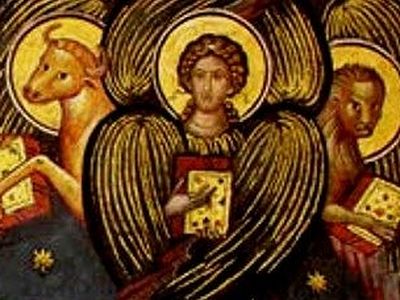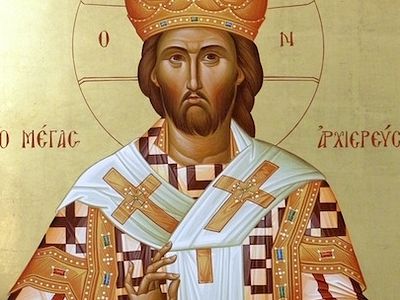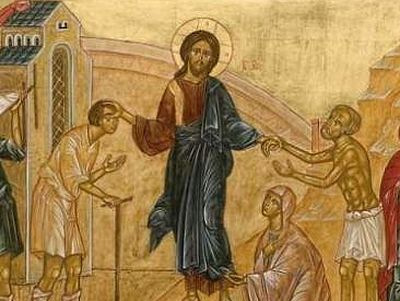Those who desire to please God, ought to offer their prayers in peace and quietness, in gentleness and wisdom, and not to give scandal to others by the use of loud outcries. The Homily also contains two questions, whether the thrones and crowns are actual created things, and concerning the twelve thrones of Israel.

1. Those who draw near to the Lord ought to make their prayers in quietness and peace and great composure, and to fix their minds upon the Lord not with unseemly and confused outcries, but with effort of the heart and vigilant thoughts. If someone suffering from a malady needs to be cauterized or to undergo a surgical operation, one man will bear the pain of it with courage and patience, self-possessed, and making no noise or disturbance, while others undergoing the same infliction give way under the fire or the knife to unseemly outcries, and yet the pain of the man who calls out is exactly the same as that of the man who does not—of him who makes a disturbance as of him who makes none. So are there some who under affliction and travail of the soul submit to it with dignity and make no disturbance, controlling themselves by mental reflexion, while others under the same affliction lose their power of endurance, and make their prayers with disorderly noise, so as to give offence to those who hear them. There are others again who are under no real concern, but for ostentation or singularity make use of undisciplined outcries, as if by these they could please God.
2. A servant of God ought not thus to lose self-control, but to continue in all meekness and wisdom, as the prophet said, Unto whom shall I look but unto him that is meek and quiet, and that trembleth at My words?1And in the cases of Moses and Elias we find that in the appearances vouchsafed to them, although there was a great ministry of trumpets and powers before the majesty of the Lord, yet the presence of the Lord was distinguished amongst and from them all, and was manifested in peace and quietness and repose. Lo, it says, a humble still small voice, and the Lord was in it.2 This shows that the Lord's rest is in peace and composure. Whatever foundation a man lays, however he starts, he will continue in the same line to the last. If he begins praying with a loud voice and noisy behaviour, he maintains to the last the same usage. Since the Lord is a lover of men, it happens that He gives succour even to such an one; so they, through the encouragement of grace, use the same ways to the last. Nevertheless we see that this is the part of the uninstructed, because they give offence to others, and at the same time are themselves in disorder at their prayers.
3. The true foundation of prayer is this, to concentrate attention, and to pray in great quietness and peace, so as to give no offence to those outside. Such a man, if he receives the grace of God upon his prayer, and continues to the last in his quietness, will edify other people more. For God is not the God of confusion, but of peace.3 Those who pray noisily are like the man who shouts to keep the rowers in time; they cannot pray everywhere, either in churches, or in villages; perhaps only in the deserts can they do it as they like. But those who pray quietly edify everybody everywhere. A man's whole labour should be employed upon his thoughts; he must cut away the bush of evil thoughts which besets him, and urge himself to God, and not let his thoughts carry him where they like, but collect them when they wander in any direction, distinguishing natural thoughts from bad ones. Being under sin, the soul comes near to being like a great wood upon a hill, or the reeds in the river, or thickets of thorns and bushes. Those who wish to pass through the place, have to stretch out their hands, and with force and laborious effort to shove aside the bushes that beset them. So do the thoughts that come from the adverse power beset the soul like bushes. Much diligence and application of mind, therefore, is required, in order to distinguish the thoughts which are not our own, but suggested by the adverse power.
4. One man, trusting to his own abilities, thinks to fell the hills round him by himself; another, governing his mind with composure and discernment, without great trouble makes more of his work than the other. Thus there are some who at prayer make use of unseemly outcries, as if they relied upon their muscular strength, not knowing how their thoughts deceive them, and fancying that they can achieve a perfect success by their own power. Others there are who pay attention to their thoughts, and exercise all their labour within. These by their understanding and discernment are enabled to reach success, and to shake off the insurrection of the thoughts and to walk after the will of the Lord. And we find in the apostle that he calls the person who edifies others greater than he who does not. He says, He that speaketh with tongues edifieth himself, but he that prophesieth edifieth the church. Greater is he that prophesieth than he that speaketh with tongues.4 Every one, therefore, will choose to edify others, and thus will have the kingdom of heaven vouchsafed to him.
5. Question. Some people tell us that the thrones and crowns are actual creatures, not spiritual things. How ought we to understand them?
Answer. The throne of the Godhead is our mind, and again, the throne of our mind is the Godhead and the Spirit. In like manner Satan also and the powers and rulers of darkness have, ever since the transgression of the commandment, seated themselves in the heart and mind and body of Adam, as their own throne. That was why the Lord came, and took His body of the Virgin. For if He had willed to come down in His uncovered Godhead, who would have been able to bear it? So He spoke to men through the instrument of the body. By this means he put down the spirits of wickedness, which had their seat in the body, from these thrones of mind and thought, wherein they dwelt, and the Lord cleansed the conscience, and made Himself a throne of the mind, the thoughts, and the body.
6. Question. What then is the meaning of the text, Ye shall sit upon twelve thrones, judging the twelve tribes of Israel?5
Answer. We find that this came to pass upon earth, when the Lord had been taken up into heaven. For He sent the Comforter Spirit upon the twelve apostles, and that holy power which came and tabernacled and seated itself in the throne of their minds. When the bystanders said, These men are full of new wine,6 Peter began at once to judge them, saying concerning Jesus, A Man mighty in words and signs ye crucified, hanging Him on a tree;7 and behold, He there did wondrous things, rending the graves of stone, and raising the dead. For it is written, In the last days I will pour out of My Spirit upon all flesh, and your sons and your daughters shall prophesy"8 Many, therefore, came to repentance under Peter's instruction, so that a new world, elect of God, came into being.
7. Do you see how the beginning of judgment appeared? A new world appeared there. Authority was given them here to sit and judge even in this world. Not but that they are to sit and give judgment hereafter, at the advent of the Lord, at the resurrection of the dead. But it came to pass here also, when the Holy Ghost seated Himself on the thrones of their minds. The diadems which Christians receive in that age are not creatures. Those who say so, say amiss. The Spirit uses them as a suggestive figure. What does the apostle Paul say concerning the heavenly Jerusalem? This is the mother of us all,9 in whose confession we agree. As for the garment which Christians wear, it is evidently the Spirit Himself that clothes them, in the name of the Father and of the Son and of the Holy Ghost forever. Amen.






